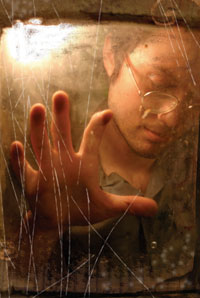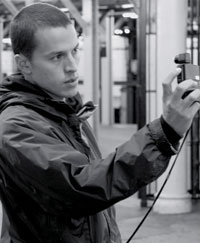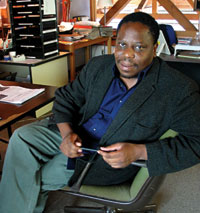25 NEW FACES OF INDEPENDENT FILM 2005
IN THIS EIGHTH EDITION OF FILMMAKER’S ANNUAL SURVEY OF NEW TALENT, WE SPOTLIGHT A GROUP OF WRITERS, DIRECTORS, AND ACTORS WHO WE BELIEVE WILL BE MAKING THE GREAT INDEPENDENT FILMS OF TOMORROW.
 |
| PHOTO : CRYSTAL DUNN |
“BRENT GREEN LIVES AND WORKS IN A BARN IN CRESSONA, PENNSYLVANIA,” begins the bio of this 26-year-old animator who has developed a novel distribution strategy for his haunting, charmingly low-fi animated shorts. “When I finish a film we do live shows with bands and sell DVD-R’s with hand-painted artwork,” Green says. “The bands improv the soundtracks and I yell the narration like a preacher. I get to work with artists I love — Califone, Sin Ropas, Garland of Hours and Brendan Canty from Fugazi.”
Green says he’s more influenced by music and books — Vic Chesnutt, Smog and the above musicians as well as writers Kurt Vonnegut, Langston Hughes and Jack Kerouac — than he is by other filmmakers. He thought up the story for his first short, Susa’s Red Ears, and decided to animate it just to see if the result would “look the way it does in my head” and was shocked when, six months later, it did. He sent the short to his favorite musicians and one, Tim Rutili from Califone, wrote back and asked if he could include the short on his next CD.
Green is working on his latest film, Paulina Hollers, with the support of a Creative Capital grant. “It’s about an asshole kid whose mother is a religious zealot and who shoots rabbits from his window,” Green says. “He gets hit by a bus and his soul slips through the floor into hell. His mom shoots herself so she can slip into hell and try to get him out.” The aboveground footage will all be stop-motion wood-carved animation, while “hell” will be hand-drawn. Again, for Green filmmaking is about communicating what’s inside his head. “You think everyone sees the world the way you do,” he says, “but then you realize, Holy crap, they don’t!” — Scott Macaulay
Contact: brent@nervousfilms.com
 |
| PHOTO: SCOTT DUNCAN. |
AT THE 2003 TRIBECA FILM FESTIVAL, A NORMAL LIFE, an unheralded film about a group of young, ambitious Kosovar refugees and their struggle to rebuild their homeland, beat out Rory Kennedy’s A Boy’s Life and Dana Brown’s Step Into Liquid to take home the Best Documentary prize on awards night. The directors, Chai Vasarhelyi and Hugo Berkeley, were in their early 20s but had been working on the film since college. “I started it in the summer between my junior and senior years at Princeton and I had no idea what I was doing” says Vasarhelyi. “We thought it would take a few months, but it ended up taking four years. Then, at Tribeca, no one knew who we were. I almost fainted at the awards ceremony. It was pretty crazy.”
After finishing the film, Vasarhelyi took a break from non-fiction, getting a plum job as Mike Nichols’s assistant on Closer before she began work on her next doc feature, a portrait of legendary African musician Youssou N’Dour, whom she met through a Senegalese bar owner in New York. “It’s a story about what happened with his album Egypt, which he recorded without ever meeting the other musicians and which finally won him a Grammy,” says the 26-year-old director. “Youssou feels there’s a fundamentalist monopoly on the discourse surrounding Islam, and he’s very invested in presenting another side of [Islam] to the rest of the world. I hope, with this film, we’ll be able to do that.” Vasarhelyi and producer Sarah Price (The Yes Men, American Movie) hope to finish the film by the end of the year. — Matthew Ross
Contact: Sarah Jane Leigh (agent): (212) 242-1740
 |
IN MAY 2003, TEXAS STATE TROOPERS DISCOVERED AN ABANDONED TRACTOR TRAILER.Inside were 81 illegal Mexican immigrants, 17 of them of dead (two more would die later). That incident — the worst of its kind in U.S. history — serves as the inspiration for Cary Fukunaga’s terrifying, masterful short film Victoria para chino. “At first I wanted to put the audience inside the truck for 10 minutes, to give them the idea of what it would be like to be in there with these people who were just trying to make a better life for themselves,” says Fukunaga, who completed the film as his second-year project at NYU’s grad film program. “But then I realized there was a lot more there — I wanted to show what happened before they got in the truck and what was going outside as it was happening. So it became a bigger film.” With only $5,000 for production yet determined to shoot on 35mm, Fukunaga went down to Mexico, where with the help of former classmate Patricio Serna they managed to get the film in the can. It has since gone on to win numerous prizes on the festival circuit and recently took home the silver medal at the Student Academy Awards.
The 27-year-old Fukunaga — who’s of Japanese and Swedish heritage — grew up in California’s East Bay and attended U.C. Santa Cruz, where a meeting with legendary film editor Walter Murch convinced him to travel extensively around the world before moving on to grad school. He’s currently at work on a feature loosely based on Victoria and hopes to continue exploring international themes in future work. “I love what Michael Winterbottom’s been doing recently,” says Fukunaga. “He’s making films all over the world and investigating all these different cultures. Ideally, that’s what I’d like to do.” — M.R.
Contact: cjf241@nyu.edu
 |
CHARLES MUDEDE IS A SEATTLE WRITER WITH A GLOBAL GOAL: “I want to invent a space where the African experience can be truly cinematic.” But for Mudede, this aim is not grandiose, just the logical conclusion of his personal experience.
Born in Zimbabwe in 1969 — when it was still Rhodesia — Mudede spent his youth moving back and forth between Africa and America. He first left for the U.S. in 1975 at the age of five, returning back to Zimbabwe, only to finally leave at the age of 19. Lured by big-budget, high-concept films like James Cameron’s Aliens and Bernardo Bertolucci’s The Last Emperor, Mudede set off to be a filmmaker.
Once he was here, however, Mudede’s interest changed. Influenced by writers like Richard Wright, he shifted to literature and cultural criticism. First writing for the Seattle alternative paper the Stranger, then for a range of other magazines, Mudede was soon recognized for his sharp neo-Marxist and multicultural perspective. These writings landed him a job as an adjunct professor at Pacific Lutheran University teaching postcolonial studies and got him the attention of filmmaker Robinson Devor, who thought his imagination and sensibility would translate into a film.
Their first script, Superpower, about a child soldier in Africa, was admitted to the 2002 Sundance Screenwriters lab but failed to get funding. Their next project, however, Police Beat, a unique story of a Senegalese-born cop patrolling the streets of Seattle, played to critical acclaim at the 2005 Sundance Film Festival. The film, partially based on Mudede’s own witty column of the same name, highlighted in a very local way the complexity of a postcolonial African experience. For Mudede, this experience is everywhere. As a writer, he is influenced by “the African language Shona, the color of African English, the Queen’s English I was taught in African secondary schools and my early experiences in America in predominantly black neighborhoods.” He brings this experience to his new script, The Minotaur, a political thriller with Africans which is to be produced by This Is That. — Peter Bowen
Contact: charles@thestranger.com
 |
| PHOTO: RON FERGUSON |
5 KYLE HENRY
KYLE HENRY’S FIRST FEATURE, ROOM, WHICH PREMIERED THIS YEAR AT SUNDANCE, was the only pic from the festival to head straight to one of the most prestigious international destinations for a first feature — a spot in the Directors Fortnight section of the Cannes Film Festival.
So why isn’t Henry being bombarded by the usual onslaught of agents and managers?
The answer probably has something to do with Henry’s desire to expand the boundaries of the feature film medium. “I love to fuck with people’s minds,” says Henry. “There are so many different ways of understanding that are underrepresented by the Hollywood paradigm, but they think it’s a failure if you don’t provide [viewers] all the signposts. However, hostility and anger towards the film form can be the first step towards understanding something new.”
Room tells the story of a Texas bingo-parlor worker who abandons her family to go on a somewhat metaphysical journey that takes her to New York City. “I was interested in a film divided into two halves: a representation of the conscious and the unconscious,” Henry says. Appropriately, then, Henry’s strengths as a director can also be divided in two — the skillfulness with which he directs actors and captures the nuances of American life, and then the confidence with which he embraces cinematic abstraction and formal experimentation.
The Austin-based Henry began his career as an editor and documentarian. He directed two docs, “one about a gay cowboy and the other about the corporatization of university education,” and he cut Eric Eason’s film Manito. He’s currently developing a script with partner Carlos Trevino set “10 steps into the future about a commune implicated in terrorist acts.” And he’s editing again. “It’s not like having a film at Cannes is an instant ticket to a full-time job as a feature filmmaker,” he says. — S.M.
Contact: cinepraxis@hotmail.com; for inquires regarding Room: general@the 7thfloor.com
Next >> [1-5 | 6-10 | 11-15 | 16-20 | 21-25]
VOD CALENDAR


 See the VOD Calendar →
See the VOD Calendar →


